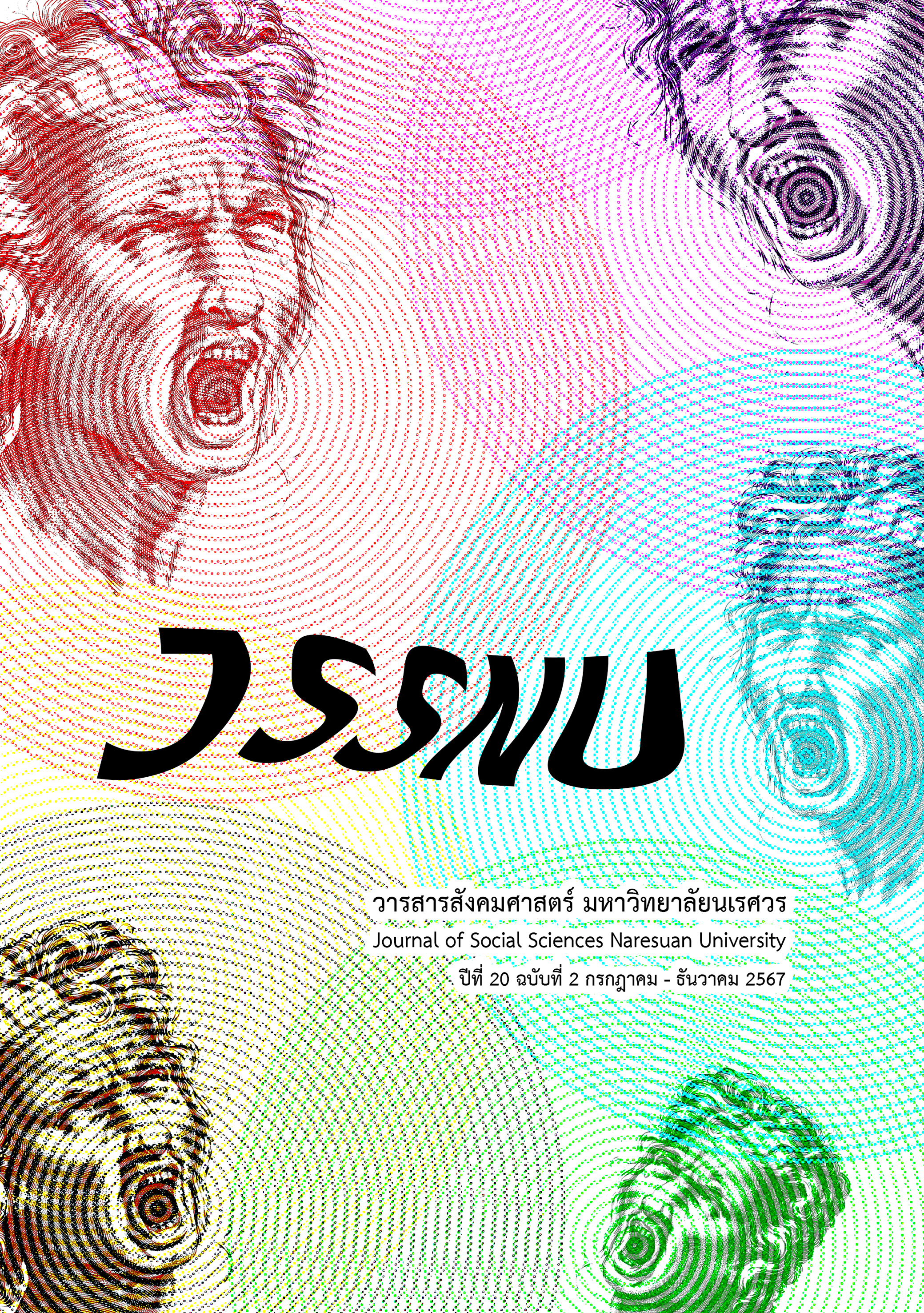Societal Constitutionalism: Constitutional Making from Below
Main Article Content
Abstract
This study examines the phenomenon of the people’s movement in Thailand, which seeks to address national issues through an urgent constitution-making process. The research focuses on two main aspects: The relationship between the constitution and people’s lives and the constitution-making process driven by people’s movements, resulting in the “People's Constitution.” The study found that the promulgation of the Constitution of the Kingdom of Thailand B.E. 2560 has impacted people’s daily lives, affecting their rights and freedoms, inequality, discrimination, and the unequal distribution of resources. The movement for a people's constitution emerged from the everyday problems people experience due to governmental policies and measures. This movement directly opposes the political status quo following the coup d'état, bringing together diverse social groups, including marginalized communities, by linking their daily issues with constitutional provisions. It is grounded in three core principles: 1) advocating for the rights, freedoms, and equality of Thai people, 2) pushing for reform of social institutions, and 3) seeking principles to address social inequality. This constitution-writing effort from below is initiated by people without state power, involving ten social identity groups and 118 organizations that collectively drafted a new constitution, which was presented to political parties and the government. Each organization advocated for amendments aligned with their specific issues, forming a continuous social movement.
Downloads
Article Details

This work is licensed under a Creative Commons Attribution-NonCommercial-NoDerivatives 4.0 International License.
References
Anderson, G. W. (2013). Societal Constitutionalism, social movements, and constitutionalism from below. Indiana Journal of Global Legal Studies, 20(2), 881-906.
Blokker, P. (2012). Constitutions and democracy in post-national times: A political-sociological approach. Irish Journal of Sociology, 20(2), 68-90. https://doi.org/10.7227/IJS.20.2.5
Brandt, M., Cottrell, J., Ghai, Y., & Regan, A. (2011). Constitution-making and reform options for the process. Geneva: Interpeace.
Chandler, D. (2002). Semiotics: The basics. London: Routledge.
Elster, J. (1995). Forces and mechanisms in the constitution-making process. Duke Law Journal, 45(2), 364–396. https://doi.org/10.2307/1372906
Halliday, M. A. (1985). Spoken and written language. Victoria: Deakin University.
Hodge, R., & Kress, G. R. (1988). Social semiotics. Ithaca, N.Y.: Cornell University Press.
Kanittakul, S. (2019, September 20). Tang ‘Khana ronnarong phuea ratthathammanun chabap prachachon’ khayap kae ro.tho.no 60 (in Thai). [Set up a ‘campaign group for the people’s constitution’ to move to amend the Constitution 2017]. THE MOMENTUM. Retrieved from https://themomentum.co/establishing-of-ccpc-thai/
Murphy, A. B. (2001). Political geography. In N. J. Smelser & P. B. Baltes (Eds.), International encyclopedia of the social and behavioral sciences (pp. 374-379). Amsterdam; New York: Elsevier.
Perju, V. F. (2023). Cosmopolitanism and constitutional self-government. International Journal of Constitutional Law, 8(3), 326-353.
Prathan ratthasapha yuen yan doen na to tam ra biap wara (in Thai). [The Speaker of the House of Representatives confirmed that the agenda will proceed according to the rules]. (2021, March 12). BBC NEWS. Retrieved from https://www.bbc.com/thai/thailand-56373603
Rap fang khosanoe kaekhai ratthathammanun chak samatcha khonchon chaoban kho sitthi chumchon-krachai amnat chatkan (in Thai). [Listening to proposals for amending the constitution from the Assembly of the Poor, Villagers ask for community rights-decentralization]. (2019, October 10). iLaw. Retrieved from https://ilaw.or.th/node/5421
Ratthathammanun haeng ratcha-anachak thai (chabap chuakhrao) phutthasakkarat 2557 (in Thai). [Constitution of the Kingdom of Thailand (Interim), B.E.2557]. (2014, July 12). Royal Thai Government Gazette. Vol. 131, Sect. 55a. pp. 1-17.
Ratthathammanun 2560: “Prot yu nai khwam sa-ngop” muk doem khong khosocho chak prachamati su nap thoilang lueaktang (in Thai). [Constitution 2017: “Please stay calm”, the old motto of the NCPO, from the referendum to the election countdown]. (2018, April 6). BBC News. Retrieved from https://www.bbc.com/thai/thailand-43650722
Saati, A. (2016). Different types of participation in constitution making processes: Towards a conceptualization. Southern African Journal of Policy and Development, 2(2), 18–28. Retrieved from https://api.semanticscholar.org/CorpusID:35434705
Sciulli, D. (1988). Foundations of societal constitutionalism: Principles from the concepts of communicative action and procedural legality. The British Journal of Sociology, 39(3), 377-408. https://doi.org/10.2307/590484
Sciulli, D. (1991). Theory of societal constitutionalism: Foundations of a Non-Marxist critical theory. Cambridge: Cambridge University Press.
Sresunt, S. (2024). Kan sang khwammai ratthathammanun chabap prachachon tam naeothang ratthathammanun niyom thang sangkhom (in Thai). [Sign making in the people’s constitution approaching on societal constitutionalism] (Research report). Bangkok: Puey Ungphakorn School of Development Studies, Thammasat University.
Tanchai, W. (2013). Rai-ngan wichai kan sang khwam prongdong haeng chat (in Thai). [Research Report on Building Reconciliation in Thailand]. Bangkok: King Prajadhipok’s Institute.
Teubner, G. (2017). Societal constitutionalism: Nine variations on a theme by David Sciulli. In P. Blokker & C. Thornhill (Eds.), Sociological Constitutionalism (pp. 313-340). Cambridge: Cambridge University Press.
Thai Lawyers for Human Rights. (2017, April 7). Ratthathammanun mai prakat chai tae “phutongha prachamati “kwa 104 rai yang thuk damnoenkhadi (in Thai). [The new constitution promulgated more than 104 referendum suspects being prosecuted]. Retrieved March 8, 2020, from https://www.tlhr2014.com/?p=3924
The Committee Campaigning for a People’s Constitution. (2019, December 15). Thalaengkan rueang “Prachachon khokhian ratthathammanun” (in Thai). [Statement on People Asking to Write a Constitution]. [Image attached] [Status update]. Facebook. https://www.facebook.com/CCPCThai/photos/pb.100080348537521.-2207520000/171313237596849/?type=3
The Election Commission. (2016). Prakat khanakammakan kanlueaktang rueang phon kan oksiang prachamati (in Thai). [Result of Thailand’s draft Constitution referendum]. Bangkok: Office of Election Commission of Thailand.
Thornhill, C. (2017). The sociology of constitutions. Annual Review of Law and Social Science, 13, 493-513. https://doi.org/10.1146/annurev-lawsocsci-110316-113518
Tushnet, M. (2015). Authoritarian constitutionalism. Cornell Law Review, 100(2), 391-461. https://doi.org/10.1017/cbo9781107252523.004
UN Constitutionmaker. (2014). Selecting constitution-making bodies. Retrieved March 10, Year, 2022, from https://peacemaker.un.org/sites/default/files/document/files/2022/07/04-selecting-cmbs_1.pdf
Wahiu, W. (2011). A practical guide to constitution building: An introduction. Stockholm: International Institute for Democracy and Electoral Assistance (International IDEA).


